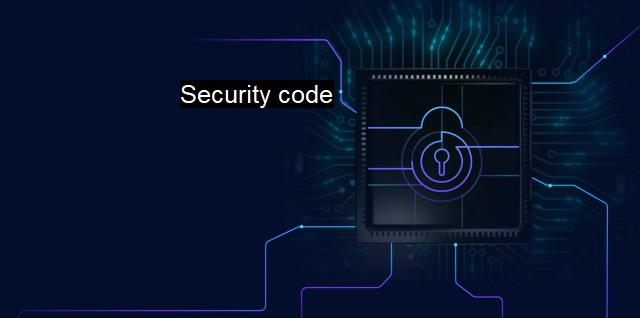What is Security code?
The Power of Security Codes: Safeguarding Against Cyber Threats
The term "security code" refers to the mechanisms and algorithms that are designed to protect against unauthorized access and data manipulation. Security codes help prevent malicious attacks and ensure that systems and networks remain secure and reliable.The Importance of Security Codes
Security codes are essential in the world of cybersecurity, as they provide safeguards against unauthorized access and potential data breaches. Without these mechanisms, systems and networks would be highly vulnerable to a multitude of different cyber-threats, such as viruses, malware, Trojan horses, and various other forms of cyber attacks.
One of the most significant advantages of security codes is that they encrypt confidential data and prevent hackers and attackers from intercepting and reading it. Encryption transforms the raw data into a format that can be read and understood only by authenticated users who possess the necessary decryption keys.
Security codes play a crucial role in virus protection and are part of antivirus solutions that are used to protect computers against malware threats. The antivirus software's security code component is a high-level mapping module responsible for interrupting and identifying malicious code from viruses and malware as it arrives.
Types of Security Codes
There are myriad types of security codes employed in cybersecurity and antivirus solutions. The following are some of the most commonly used mechanisms:
Encryption Mechanisms
Encryption is one of the most effective security technologies available today, consistently used to ensure data privacy. It prevents packet sniffing attempts from text/plain messages sent over the internet by employees of an organization. Private and sensitive data sent between devices or machines is encrypted, making it unreadable by unauthorized people. Proper encryption mechanisms are also used on credit and edebit card transactions on the web.
Access Control Mechanisms
Access control mechanisms allow users to control which programs, data, systems, or portions of systems other users can access. Access control mechanisms most common types include biometric readings, physical access barriers lock (PIN,Password, or OTP code )for technological items.
Application Access Control Mechanisms
Application access confirmation protocols ensure that only authenticated and authorized users can access specific computer applications such as specific compilers, system libraries, and applications utilized for configuring and manipulating the technology.
Identity Verification Mechanisms
Identity authentication and verification mechanisms enable users of digital technologies to login securely, verify identity it is most notably referred to as multi-step verification methods for safety-reinforced authentication. Multiple verification methods assist in keeping user profiles, accounts, and confidential data safeguarded.
Authenticity Verification Mechanisms
Digital signatures and certificates, watermarks, and electronic seals can improve data authenticity, especially in handling originality verification and integrity requirements. These security codes give users ways of certifying and valuing the interactions they are taking part in during web-based communication.
Final Thoughts
Security codes play a crucial role in cybersecurity and antivirus systems. They ensure data is privacy is maintained and support the proper flow of confidential data between machines and systems. Access control mechanisms are among the critical options in facilitating authorized access to data coupled with encryption capabilities.
As we conduct transactions online using sometimes a wealth of confidential data, security codes provide a foundation for reducing tated risks. It is essential to interact online using protocols and practices that put much effort to protect the digital data we interact online, relying on anti-virus software, filtering systems among others technology's recommended solutions. With programmers, software and technology's constantly upgraded and modifications represented, robust securities measures and software solutions most recommended security tools for interconnection coupled with API exchanges today are blockchain solutions.

Security code FAQs
What is a security code in cybersecurity?
In cybersecurity, a security code refers to a unique string of characters that is used to verify the identity of a user or device. It is often used in conjunction with antivirus software as an extra layer of protection against unauthorized access or malware attacks.Why is it important to have a security code in antivirus software?
Having a security code in antivirus software helps to ensure that only authorized users can access and make changes to the software. This helps to prevent unauthorized access by hackers or malware attacks that could compromise the security of your computer or network.How is a security code used in antivirus software?
In antivirus software, a security code is usually used as a form of authentication when accessing certain features or settings. It may also be used as a password reset or recovery method in case the original password is forgotten or compromised.What are some best practices for creating a security code in cybersecurity?
Some best practices for creating a security code in cybersecurity include using a combination of letters, numbers, and special characters, avoiding easily guessable phrases or personal information, and changing the code regularly. It is also important to keep the code secure and not share it with anyone else.| | A | | | B | | | C | | | D | | | E | | | F | | | G | | | H | | | I | | | J | | | K | | | L | | | M | |
| | N | | | O | | | P | | | Q | | | R | | | S | | | T | | | U | | | V | | | W | | | X | | | Y | | | Z | |
| | 1 | | | 2 | | | 3 | | | 4 | | | 7 | | | 8 | | |||||||